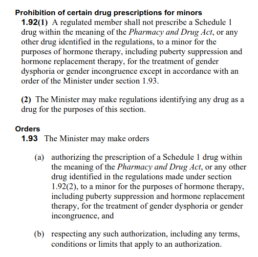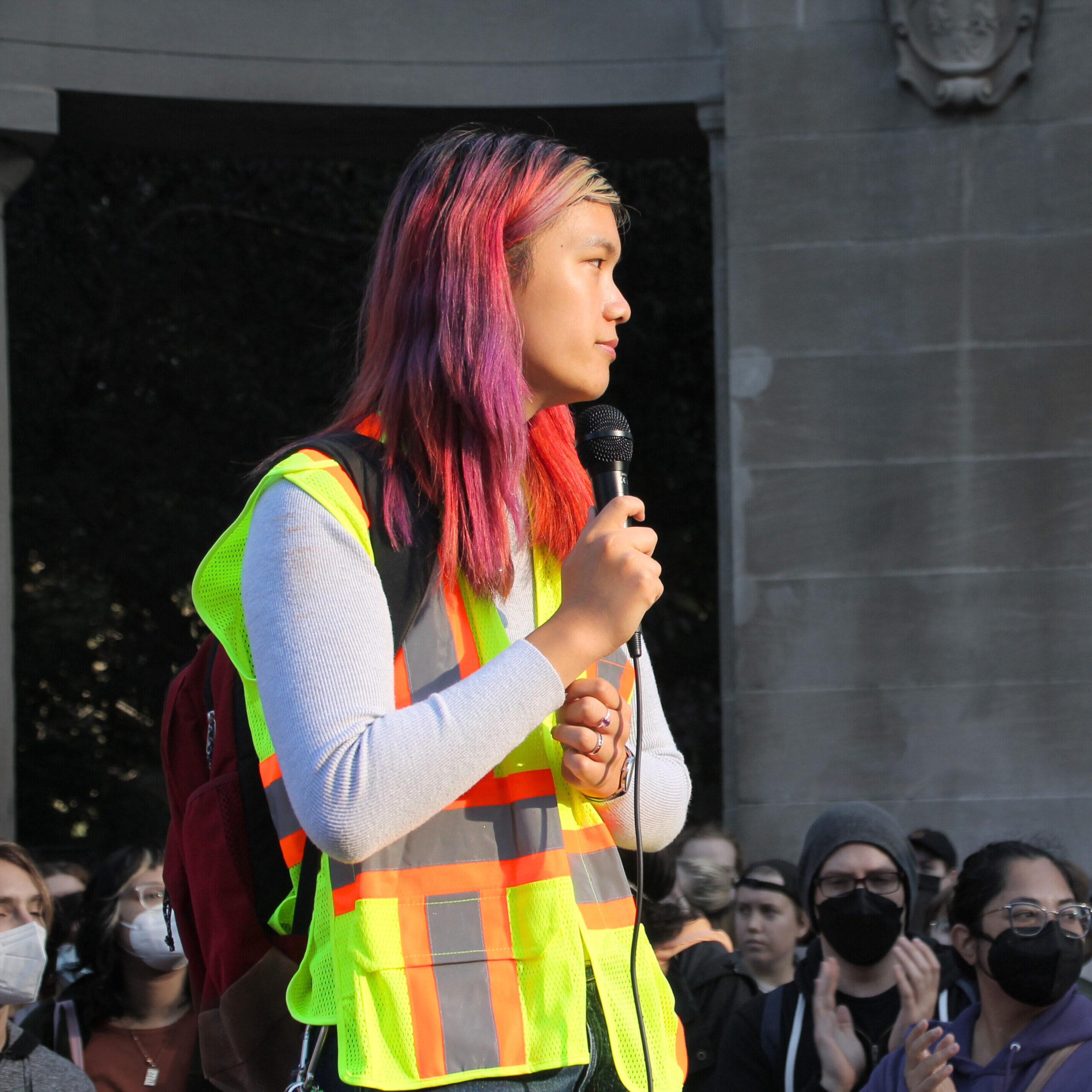Note: This is a “statement” from Celeste’s Instagram page, retroactively posted to her website. The bills in question were passed on December 3rd, 2024.
On October 31, 2024, the Alberta government, led by United Conservative Party leader and Premier Marlaina Danielle Smith (who goes by her middle name Danielle), introduced three pieces of anti-trans legislation that goes beyond anything else we’ve seen thus far in Canada: Bills 26, 27, and 29.
The three bills, being the Health Statutes Amendment Act, 2024 (No. 2) (Bill 26), Education Amendment Act, 2024 (Bill 27), and Fairness and Safety in Sport Act (Bill 29), creates a social context in which trans people are actively punished for being trans, and nothing more: these bills significantly restrict the social participation of trans youth in particular, preventing them from thriving the same way as their cisgender peers would.
Alberta Bill 26 implements the gender-affirming care ban Danielle Smith promised back in January 2024 — which, would be Canada’s first. Bill 26, being an omnibus bill, modifies the law as it pertains to a variety of fields as it pertains to healthcare, but most notably the Health Professions Act, which regulates health professionals in Alberta.
Said bill restricts medically necessary healthcare for vulnerable youth, by forbidding Alberta regulated healthcare professionals, such as doctors and pharmacists, from prescribing puberty blockers and hormone therapy to a person age under 18, through an amendment to the Health Professions Act. It also prohibits surgeries related to gender affirmation for said youth. The bill enables the government to define exceptions by order-in-council, with which the UCP government has announced its intention to carve out an exception for youth aged 16-17 and introduce a ‘grandfather clause’. However, whether it will follow through with that or no remains to be determined.
Here is a copy of some of the relevant provisions of said bill:

Back when the measure was first announced in a Twitter video at the end of January 2024, the Alberta Medical Association’s Pediatrics section (and later the AMA itself), the Canadian Pediatric Society and Amnesty International Canada have voiced their opposition, the bills being contrary to medical best evidence and practice. Skipping Stone, a Calgary-based organization serving the local 2SLGBTQ+ community, has promised to sue, and has subsequently filed a lawsuit alongside Égale Canada and fellow Albertan families with trans youth. More broadly speaking, mainstream medical organizations have unanimously come out against gender-affirming care bans, for the same reasons, and have held their position despite bullying by politicians.
The Education Amendment Act, 2024 is Canada’s worst anti-trans education bill thus far. First and foremost, it requires opt-in consent for sex ed — a measure targeting all youth in Alberta, and which not only denies 2SLGBTQ+ people’s ability to see themselves within said curriculum, but equally denies knowledge about consent, puberty, and the human reproductive system. Even for students whose parents opt-in their kids into said classes, Alberta school boards will be forbidden from using learning and teaching resources “that deal primarily and explicitly with gender identity, sexual orientation or human sexuality” without Ministerial approval.
As it pertains to trans youth though, it gets worse. Said bill forbids a student under age 16 from using a new chosen name or pronouns without parental consent. It also mandates, for all students under the age of majority (being 18 in Alberta), that the school board must notify the student’s parent(s) if the fact that said youth wishes to use a new chosen name or pronouns is brought to the attention of the school board, the school, or even just a teacher — forcibly outing their identity to their parents. Research by the U.S.-based Trevor Project in 2022 has revealed that fewer than one in three trans youth found home to be a safe space for them, as a trans person; for the other two in three youth, it can push them to consequences as severe as homelessness or suicide. Teachers and school staff are explicitly forbidden from using the chosen name or pronouns of their student in school unless said criteria is respected. The legislation explicitly states that this restriction only applies if the chosen name is chosen for gender identity-related reasons — a cisgender student, who say, wishes to go by Chris instead of Christopher, would not be affected, unless they are doing so because of their gender identity. Finally, said bill also forbids anyone from suing the government, schools, or school boards for any damages arising from forced outing, deadnaming or misgendering. Talk about arbitrary!
Finally, Bill 29, the Fairness and Safety in Sport Act creates a legislative framework requiring school boards, charter and private schools, public post-secondary institutions and provincial sport organizations to establish policies “respecting fairness and safety with respect to each relevant sport”. Said policies must then dictate “eligibility requirements to participate in the relevant sport” and processes to determine this, and “provisions or content prescribed by the regulations”. Danielle Smith has announced that the intent of the bill is to ban trans women from women’s sports teams, something which will be implemented through such regulations. This bill would even apply within the context of mandatory physical education courses, once again disproportionately impacting trans girls. Finally, similarly to the Education Amendment Act, a non-liability clause is included, to make sure that any affected trans person has no legal recourse whatsoever to sue the government.
These bills, as a whole, will have a devastating impact on trans youth, trans women, and trans people as a whole in Alberta. We can infer answers on how bad this impact would be from our southern neighbors. In U.S. states with anti-trans legislation passed into law, the incidence of suicide attempts per year among trans young people has increased, according to a study published in Nature, by up to 72%. As for the positive impacts of gender-affirming healthcare, they’re well-documented: outcomes are overwhelmingly positive, and enable trans youth to become well and healthy trans adults — instead of dead trans youth or unwell trans adults.
Whether these bills will stand up in court will depend on both the test of time, and whether the Alberta legislature invokes the notwithstanding clause of the Canadian Charter (update: they likely will). One thing remains certain though: the impacts of these bills cannot be understated.
